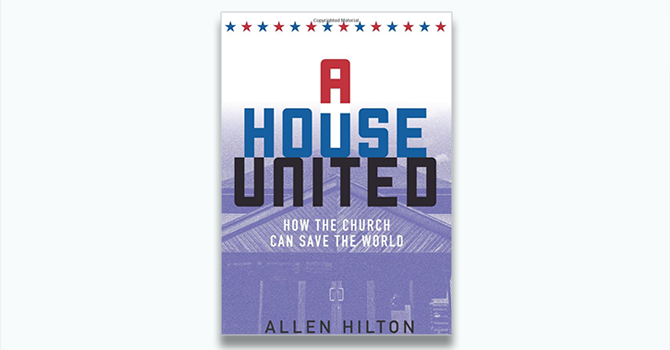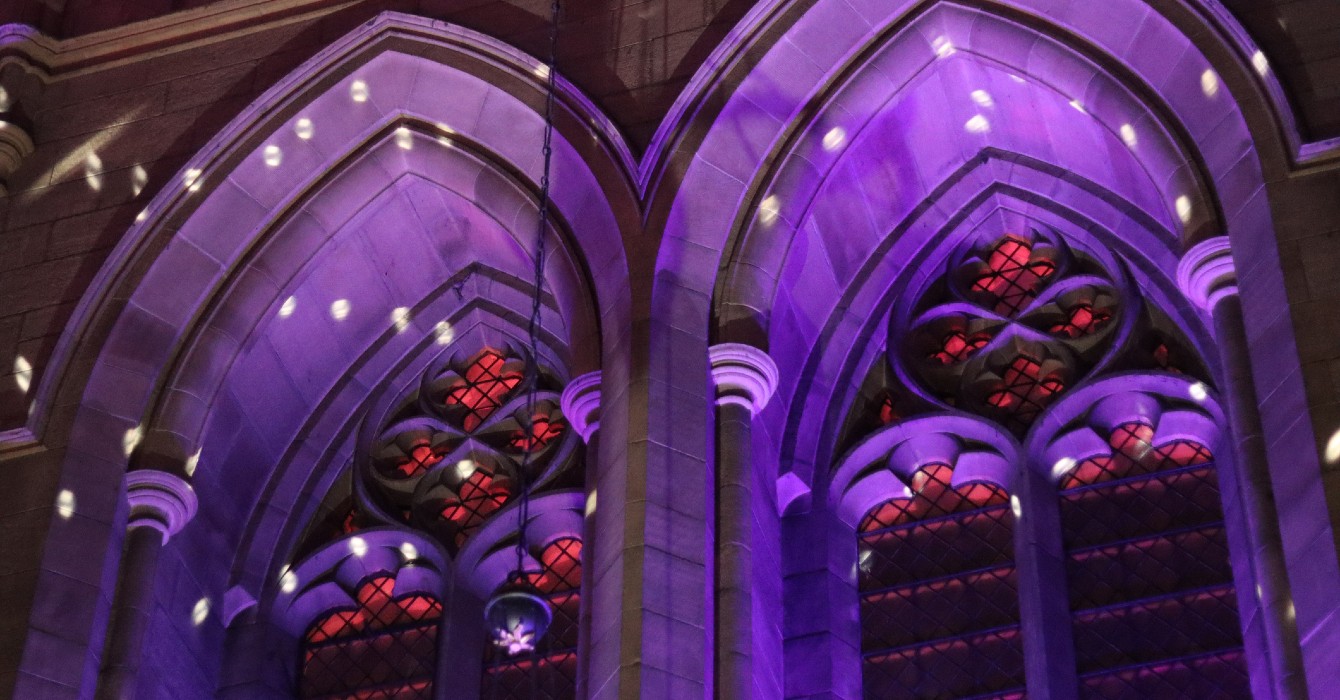When a zoning board has to call in the police to keep order, when 40 percent of Americans don’t want their children to marry across party lines, when 30 percent of national security professionals predict a U.S. civil war, there’s something wrong with our society, says the Rev. Dr. Allen R. Hilton.
And maybe, he says, the church can help fix it.
 Hilton is the founder of House United -- the name is a play on Abraham Lincoln’s famous “house divided” speech -- a nonprofit dedicated to “bringing people together across political, religious, and racial difference for the common good.”
Hilton is the founder of House United -- the name is a play on Abraham Lincoln’s famous “house divided” speech -- a nonprofit dedicated to “bringing people together across political, religious, and racial difference for the common good.”
Hilton is working with about 25 churches across the country to lead a series of conversations about difficult topics. As congregations develop this practice, he hopes they will be able to move beyond church walls to help heal divisions in their communities and the nation.
An ordained minister in the United Church of Christ, Hilton previously served three congregations in Connecticut, Washington and Minnesota and taught at Yale Divinity School and St. Mary’s College of California.
He is a graduate of George Fox College, Princeton Theological Seminary and Yale University. His book “A House United: How the Church Can Save the World” was published in April.
Hilton spoke with Faith & Leadership while teaching at the Summer Institute for Reconciliation of the Center for Reconciliation at Duke Divinity School. The following is an edited transcript.
Q: What was your inspiration to found House United?
I come from evangelicalism and have spent time in progressive circles. It started to grieve me more and more how [the two groups] were talking about each other. I saw too often stereotypes and almost bigotry from the left toward evangelicals and from the right toward progressives.
I wouldn’t give up the things I learned in either place. So I thought I’d really like them to meet each other and actually get the benefits of their differences.
I started in my last church post to do that, to have courageous conversations across theological and political differences within the congregation. It became clear to me that I wanted to widen the number of people who might be reached by this. In 2016, I founded House United, which is a nonprofit that involves helping people figure out how to talk to one another. So I do events that bring people and churches together that usually wouldn’t meet.
Right now, I am the primary mover. It is getting to the point where my schedule is full enough that I’m going to need to find partners, but it’s a young ministry. I’ve got clusters of churches across the nation. I’m hoping to have a cluster of churches in each major metropolitan area within the next three years devoted to this mission as a part of what they do.
Q: How do you foster these conversations, and how do you get people together?
I roll out a question -- such as, “Is the United States a Christian nation?” -- having sent out a preparation guide that is a balanced treatment of different theological or political positions on the issue.
After we do some prep and table setting -- which includes [rules such as] we’re going to listen lovingly; we’re going to be able to repeat back what somebody has said in other words; we’re going to say after each person speaks, “Listen for what the Spirit is saying to the church”; we’re going to move it out of the bar-stool debate into the church-discernment realm -- they just talk.
I ask a first question. At first, people are very nice and reserved, because they don’t entirely trust that if they speak what they believe they won’t be stigmatized, especially if they feel like the minority position in the room.
But after a time, they start to trust the group, and after two or three of those conversations, we get beyond tolerance to a kind of mutual respect. Then after four or five, we get to people opening themselves to learn from one another.
They start to realize we can now do something better than either of us would have come up with, because we’re in the same room talking.
That’s a step forward, not only for church, but it’s a step forward for culture and government and all the places where we’re running into stymied positions because we’re set over against one another.
A lot of people come out for these [conversations], and my read on that is they want to be a part of the solution. They don’t feel good about having enemies in their own town, but they need leaders. They don’t know how to get out of the ruts and echo chambers without somebody giving them a hint about how to do that.
I usually go in and lead one and then am usually invited back to lead a couple more, during which I train leaders. Beyond that, once a month is a good rhythm.
The ideal here is they’re doing the hard issues once a month and they’re getting better at it, so that the church becomes a place where if there’s a conflict in the city or if there’s a conflict in the church, they say, “You know what, we’re going to have a courageous conversation about this next week; we’re going to take it up.”
It’s a Christian practice they’re building. The churches that have been doing it longer are getting better and better at it, so it’s like building any other muscles.
Q: When you say “courageous conversations,” is that a particular methodology or process?
I brand it as “courageous conversations,” but I’m fully aware that there are other people who are calling other things courageous conversations. It’s a methodology that I’ve created borrowing from Harvard’s work on difficult conversations, borrowing from Scripture, borrowing pretty indiscriminately from a whole lot of different places and then just trying to apply wisdom to the specifics of the conflict in the church.
Q: You draw people from the same congregation who disagree with each other. Do you also pull together people from separate congregations or organizations?
Communities of trust do this best -- people who know each other, even if it’s just from being in the same sanctuary.
But in an ideal world, the congregation becomes adept at this, and they become the host for conversations in their community. The dream here is that people start saying, “I don’t know what else they do in that church, but they seem to be really good at talking to one another about hard things. We can’t get anything done in the city government, so we’re going to go ask the church to come help us with how to do this.”
So we start it in the trust community, and then we let it spill over into other communities.
Q: Have you had this experience of it spilling over outside the church into other realms, or is that just your dream?
I work with a church in Westport, Connecticut, called Green’s Farms Church. They’ve been working with courageous conversations for a little bit.
In the town of Westport, they’ve had to call the police in at planning and zoning meetings. Well, people in the church immediately wrote me and said, “When can we help these people?” They’re working on it right now.
There is another forum in which I do courageous conversations that doesn’t say, “Listen for what the Spirit is saying to the church”; it says things like, “Let’s form a more perfect union.” It tells people that this isn’t a fight; it’s a discernment.
An example of that that’s not House United-generated is Amy Butler at Riverside Church. When Brené Brown and DeRay Mckesson start to talk together on Twitter and go back and forth and a bunch of people follow it, [Butler] says, “Why don’t we have this conversation in real life, have it in our church, have an audience there and let you guys just talk it out?”
I love what she’s doing. That’s the kind of function I look for House United to have, to bring together -- it’s the spirit of the House United vision of, “Let’s help our world do this. Let’s be the conveyor of conversations that work.”
Q: So tell me about your book, “A House United: How the Church Can Save the World.”
It comes from the notion we were just talking about. One of the stats I like to use to make American polarization vivid to people is that in 1960, American parents were asked in a broad survey whether they would be concerned if their son or daughter married someone from the opposite political party.
In 1960, 5 percent said they would be displeased if their son or daughter married across parties.
In 2010 -- and this was before the 2016 election cycle, this was before polarization had gotten even more extreme -- it was about 40 percent.
People say, “I can’t get together with my family at Thanksgiving anymore, because things blow up if we go anywhere but football and weather.” Friends can’t go to coffee.
The book is about looking at that reality in a Jeremiah kind of way. In Jeremiah 29, Jeremiah writes to the exiles in Babylon who are confused and displaced and trying to figure out what they’re going to do. They’re a little angry and frustrated, and they’re tempted to hunker down and just sit it out and try to endure. He says to plant gardens, build homes -- seek the welfare of your city, for in their welfare lies your welfare.
And so in that spirit, I look around and say, “Maybe the church ought to notice that the world around us needs to figure out how to at least coexist -- and probably how to thrive -- amid the current political division. Let’s help them.”
Foreign Policy magazine did a survey and asked what probability [people] would place on the United States entering an armed civil war. National security experts put the likelihood at 30 percent.
I don’t want to be alarmist with that stat, but it does indicate that maybe the world needs help. How might Christians help it out and be -- ironically, after 2,000 years of division and divisiveness -- what if we became the bring-together kind of people?
The book is designed to start within Christianity, because Jesus prayed that they [Christians] all may be one (John 17:20-21). When Jesus pictured Christian unity, he wanted it to happen, and he wanted it to impact the world.
Religion has been bad at this for a long time. What if we move the picture here and make ourselves a part of the solution to our culture?







